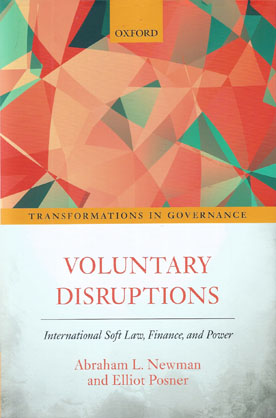We will be closed from 5pm Thursday 17th April for the Easter Bank Holidays, re-opening at 8.30am on Tuesday 22nd April. Any orders placed during this period will be processed when we re-open.

From home mortgages to i-phones, basic elements of our daily lives depend on international economic markets. The astonishing complexity of these exchanges may seem ungoverned.
Yet the global economy remains deeply bound by rules. Far from the staid world of treaties and state-to-state diplomacy, economic governance increasingly relies on a different class of international market regulation - soft law - comprised of voluntary standards, best practices, and recommended guidance created by a motley assortment of international organizations.
Voluntary Disruptions argues that international soft law is deeply political, shaping the winners and losers of globalization. Some observers focus on soft law's potential to solve problems and coordinate market participants.
Voluntary Disruptions widens the discussion, shifting attention to the ways soft law provides new political resources to some groups while not to others and alters the sites of contestation and the actors who participate in them. Highlighting two mechanisms - legitimacy claims and arena expansion - the book explains how soft law, typically viewed as limited by its voluntary nature, disrupts and transforms the politics of economic governance.
Using financial regulation as its laboratory, Voluntary Disruptions explains the remarkable pre-crisis alignment of US and European approaches to governing markets, the rise and prominence of transnational industry associations in the 1990s and 2000s, and the ambivalence of US reforms towards international market cooperation in the wake of the 2008 financial crisis. Rethinking scholarly and policy approaches to international soft law, this volume answers enduring and pressing questions about global finance, International Relations, and power.